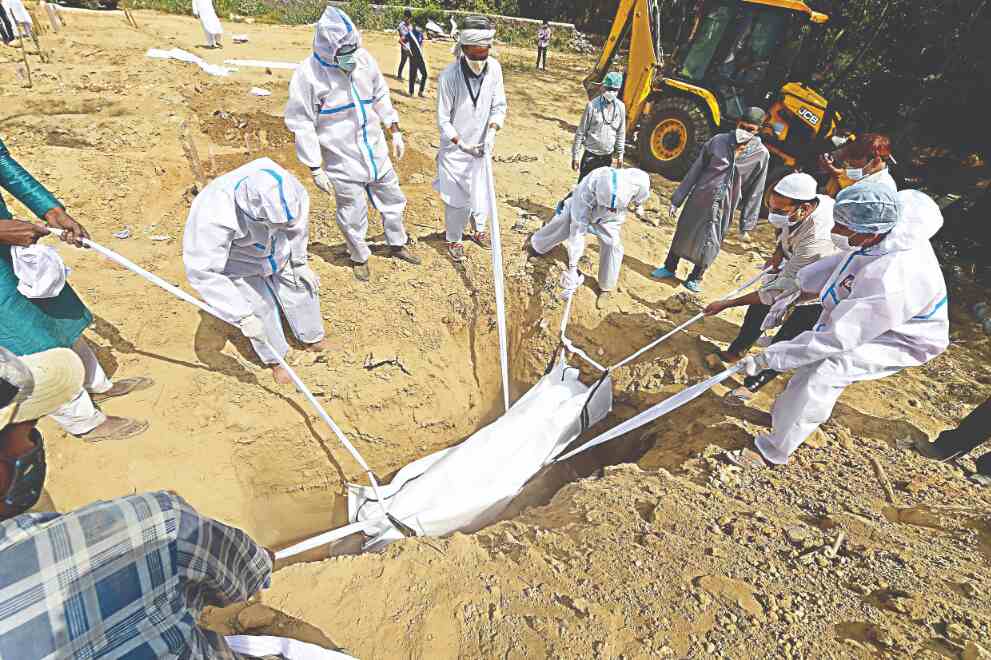ITO cemetery runs out of space; crematoria work to add platforms

New Delhi: As the death toll due to Covid in the city spirals out of control, with scores of patients breathing their last outside hospitals, crematoriums and burial grounds in the city have been buckling under pressure, unable to provide space to the daily rising casualties.
At the Jadid Qabristan Ahle Islam at ITO, city's largest burial ground, supervisor Mohammed Shamim said that they will be closing their gates to Covid bodies from Sunday onwards since the separate six-acre designated Covid block has become full to the brim.
"We can't accommodate any more bodies now… we currently have around 1,300 Covid bodies buried here in total out of which over 200 bodies have been buried here since April 4," Shamim told Millennium Post.
"We have written to the Delhi Waqf Board which will further convey to the government that we have been running out of space...and a five acre plot nearby should be designated as a burial ground so that we can accommodate more
bodies," he said, adding, "In the past few days we have doubled the number of staff in order to cope with the spiralling
death toll".
At the Nigambodh Ghat, the registration desk for arranging a cremation pyre and wood was flooded on Friday with relatives who complained of long waiting hours for conducting funerals at the cremation ground.
Meanwhile, at around 1 pm, ambulances could be seen lined up outside the crematorium with at least six of them waiting outside the premises while another six lined up near the burning pyres, each of them carrying two bodies. One could see two ambulances entering the premises every 15 minutes from the nearby hospitals.
Geeta Colony resident Sunny, who came for his friend's dad's funeral, said that they came around 11 am and had to wait till 2 pm in order to dispose of the body through a
CNG incinerator. "The crowd has reduced now but there wasn't any space to stand here in the morning...the whole space was filled with ambulances and relatives...it is a catastrophe…" he said.
The demand for wood has also increased fourfold with the crematorium staff having to carry their carts carrying wooden logs towards the funeral pyres at least 10 times in a span of 30 minutes.
Subhir, who supervises the wood supply at the crematorium, said that around 600 quintal of wood is now needed in order to deal with the rising death toll. "We earlier needed around 400 quintal of wood but now the frequency of bodies coming here have increased…" Subhir said. "There has been a lot of pressure since the last few days...we have around 30 persons who cut wood and carry them to the pyres".
Another person, who's mother-in-law had died of Covid, said that he reached the place at 10:30 pm and four hours have passed since, but the staff is saying that they will have to wait for another hour to carry out the funeral of their kin.
Manoj, a staff member, said that there are around 140 funeral pyres at the crematorium at present, in addition to 6 CNG incinerators, but around 240 bodies have been arriving there on a daily basis which has further added to the space crunch. "We are building six more pyres on the banks of Yamuna river nearby and it will be up and running soon," he said.
Meanwhile, at the Karkardooma crematorium, nine bodies could be seen burning on the funeral pyre while two CNG incinerators were being constructed in view of the rising death toll. Sevadar Rahul said: "Since the past few days we have been getting at least nine bodies on a regular basis… the relatives keep fighting over who will burn the bodies first...it's challenging to handle them… earlier we used to get two to three bodies but there has been a sharp spike now".



